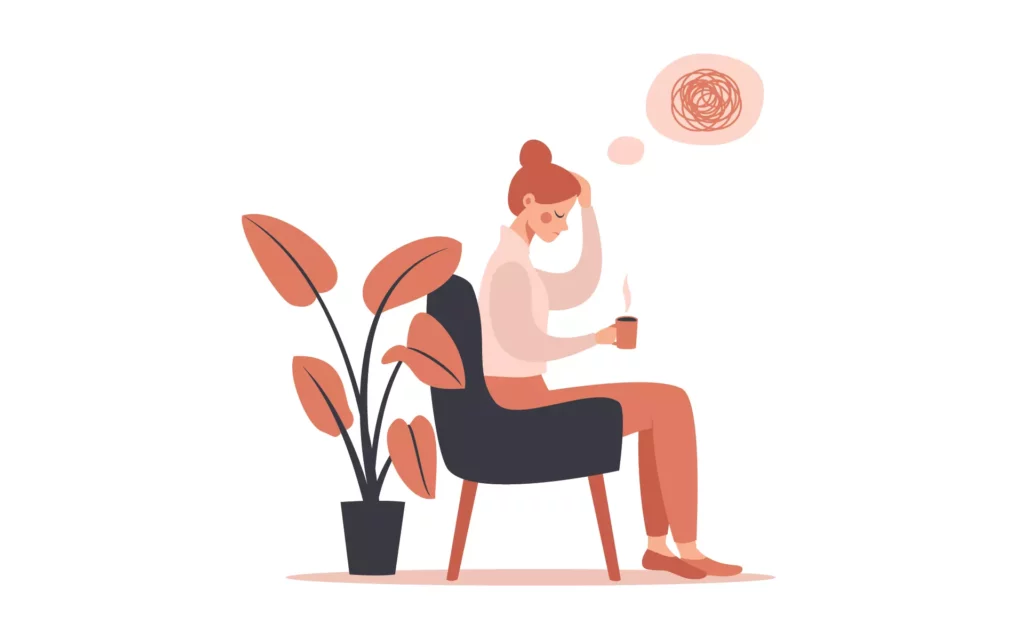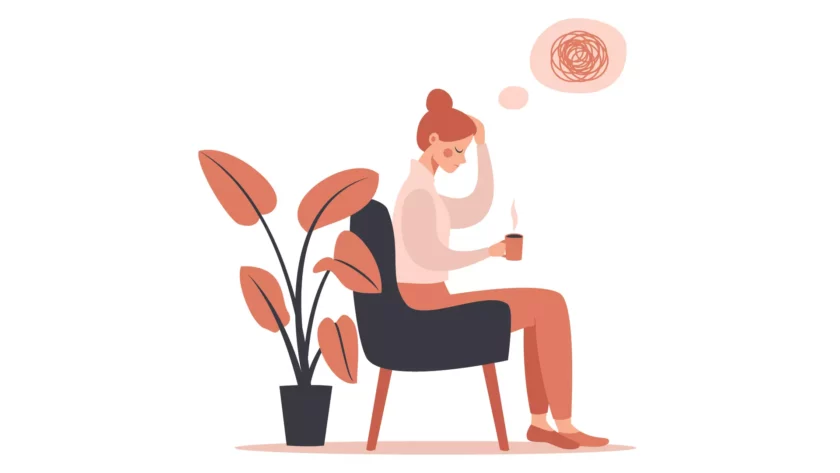Insomnia is a common sleep disorder, which affects women more than men, and insomnia in females can be due to many reasons.
During this, where a person hard to fall asleep, which affects about 35% of adults.
About 10% and 30% of adults may face insomnia at any given point in time and up to half of the people have insomnia in a given year (1).
Lack of sleep or waking too early can become a serious issue, like a high risk of accidents, in long term this can affect the life of quality.
Many adults experience short-term (acute) insomnia, which lasts for days or weeks, as a result of stress, also known as stress-related insomnia.
If it stay lasts for longer than a month, then consider long-term insomnia, which is also allied with medical issues or certain drug use.
Insomnia is considered more common in women than men, several studies found a higher rate of insomnia in women.
It is an easy-to-diagnose condition with asking many questions and answers by a healthcare provider for aid.
However, there are some common conditions that can make the insomnia situation worse like anxiety, depression, and alcohol intake (2).

Is insomnia more common in females? But why?
Contents
Several studies indicated that women are about 1.3 to 1.8 times more prone to develop insomnia, than men.
A study shows that Brazilian women are at a high prevalence of sleep disorders like sleep apnea, and restless leg syndrome.
Obese women are at high risk of sleep fragmentation and insomnia due to respiratory problems during sleep than normal BMI women (3).
Different sex is also related to sleep which is related to biology, whereas, hormone production and circadian rhythms are different in men and women.
Both have totally different physical and mental health issues, which may also contribute to the sleep-related disorder (4).
Another’s international studies have also shown insomnia to be more common in elders and women.
Who are at high risk of insomnia?
It affects all ages of people, but some people are more at high risk of insomnia including:
- Older people, especially those above 60
- smokers
- chronic diseases such as diabetes, kidney, lung, and heart disease
- alcohol or drug use disorder
- irregular shift changes due to work
- who are under a lot of stress
- smokers
- history of mental health disorders like depression
- traveling through different time zones (5)
Older women adults are likely to experience multiple symptoms of insomnia (6).
Even though hormone changes in females during the menstrual cycle, pregnancy, and postmenopause may lead to discomfort and pain.
This may lead to dysmenorrhea, nausea, and vasomotor symptoms, all of these conditions may disturb sleep and lead to reduced sleep.
Reasons for insomnia in women
There are many potential reasons for insomnia in women which include:
Hormonal changes
Women’s hormonal are a bit different from men’s hormones, for example:
In men, the testosterone hormone is responsible for sex, whereas, estrogen in women is vital for the reproductive system.
Women’s sex and their two most vital hormones estrogen and progesterone are involved in a variety of functions including regulating sleep.
These 2 hormones’ levels change throughout their life starting with puberty, period, pregnancy, and menopause (7).
The body uses hormones to send messages throughout the body, which are responsible for many vital functions including:
- Regulating sexual function
- metabolism
- mood
- sleep
- growth and development in mental and physical
Pregnancy
Research has shown that Insomnia during pregnancy is normal and affects about 80% of pregnant women (8).
Is not necessary that pregnancy can definitely do sleep disturbance, in 1st trimester both vital hormones rise considerably.
This leads to feeling sleepy, which is why many women feel sleepy during the early stage of pregnancy (9).
There are many causes of insomnia during pregnancy which include:
- Growing belly discomfort
- frequent urination
- heartburn
- pain
- anxiety feeling
- hot flashes
- breasts might feel sore and tender during pregnancy
- weird dreams
- stress due to not getting enough sleep, for future delivery, etc
Sleep problems and changes start during the first trimester of pregnancy (10).
Check Out – Best Sleeping Position During Pregnancy
Menstrual cycle
Studies have shown that women with PMS are twice as likely to experience insomnia before and during their period.
During the menstrual cycle, cramps pain, anxiety, discomfort, irritability, etc become a potential reason for not being sleepy.
Sleep efficiency declines but the most pronounced decline are occur in the last week of the menstrual cycle (11).
In periods, hormones will rise and fall, before the period starts progesterone levels rise, and during periods levels will fall (12).
Check Out – Irregular Periods in Teenage Years: Causes, Treatment, Risk
Menopause
The spreading of insomnia increased from 33%–36% in premenopausal women to 44%–61% in postmenopausal women (13).
When the menstrual cycle is stopped for 12 months or permanently after 45, so this is called menopause.
Several studies have shown that perimenopause, menopause, and postmenopause often lead to sleep disturbances lead to insomnia.
Hormone replacement therapy has been shown to improve sleep in some postmenopausal women with insomnia (14).
2018 article wrote that 26% of women going through perimenopause and menopause experience insomnia.
Menopause symptoms are one of the main reasons for insomnia – hot flashes, reduction in melatonin, and mental health.
Stress, depression, and anxiety
Women go through many changes in their life, which trigger their sleep rhythms, which may lead to stress, anxiety, and even depression.
Studies show that caregivers women (66%) than men are more prone to report stress, depression, and sleep disturbances
Women not only fall in this category but men also where future job tension, family, relationship, etc are leads to all stress.
An anxiety disorder also can prevent you from staying asleep long enough to be fully rested (15)
Insomnia may create difficulty in regulating emotions, and these results, people are more vulnerable to depression in the future.
Stress can lead to anxiety, and long-term anxiety can cause depression, so shown all are linked to each other.
Dip out – Is Music Can Treat Mental and Physical illness
Disease or illness
Women’s illnesses – mean – that occur only in women, there are certain health issues that make sleep difficult including:
- PCOS (Polycystic ovary syndrome) causes irregular periods
- diabetes
- urinary tract infection
- thyroid
- post-traumatic stress disorder (PTSD)
- High blood pressure
However, common diseases like – High BP, diabetes, and other health issues, are common along both men and women.
Management
As we know, there are many reasons for insomnia in women.
And by treating or managing that cause, insomnia in women can be reduced to a great extent for exa:
Sleep hygiene or routine
During pregnancy bedtime routine or hygiene like a bath before sleep, stimulates your melatonin (a sleep hormone).
Trying to go to bed at the same time every night also avoids Tv, mobile, and laptop, which may interrupt sleep rhythm.
The bedroom environment is as vital as sleeping habits, which should be cool, and dark which should be cool, and dark.
Essential oils
During periods, a lady can use an essential oil diffuser, before sleep, and yes it really relieves period pain.
The essential oil contains varieties of properties like antiseptic, anti-inflammatory, etc, which are even used in cramp medicines.
You can use it as a massage on the abdominal area or you can put 1 to 2 drops in a cup of tea, which will give relief from inside.
Relaxing technique
The aim of relaxation is to reduce inner anxiety, and stress, which happen due to thoughts of delivery, pain, and more.
A variety of relaxation techniques can be used in the treatment of insomnia, including yoga, and meditation.
Tightening, relaxing, and breathing exercises like Anulom vilom, can be used before bedtime sleep.
Exercises
Exercise, which makes you tired before you go to bed.
Several studies showed that regular exercise is the best way to convert irregular periods to regular periods.
However, a hard exercise or too much exercise might be a reason for insomnia that is seen as common in athletes
Know – Drink Enough Water And Doing Exercise Prevent The Diseases?
Medications
4 and a half% of pregnant women admit to the use of sleep medication and 1.9% of natural remedies (16).
There is no OTC medicine for frequent nighttime urination during pregnancy so it is better to go before sleep or reduce water intake.
NOTE: Before taking any type of medicine whether it is herbal, or chemical, consult the doctor first.
BOTTOM LINE
Insomnia is considered more common in women than men, several studies indicate that insomnia is higher in women.
Sleep apnea and insomnia are more common sleep disorders that can affect more during pregnancy, period, and menopause.




